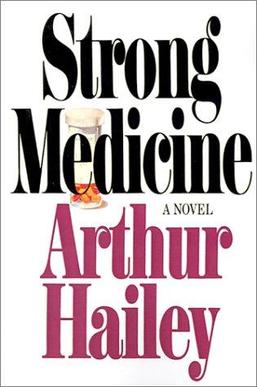Strong Medicine (novel)
Strong Medicine is a novel written by Arthur Hailey, a British/Canadian author known for his work in the thriller and disaster genres. The book, published in 1984, delves into the pharmaceutical industry, exploring the complexities and ethical dilemmas of medical research and drug marketing. Hailey's meticulous research into the pharmaceutical world is evident in the detailed descriptions and realistic portrayal of the industry's challenges and controversies.
Plot Summary[edit | edit source]
The novel follows Celia Jordan, an ambitious woman who works her way up from a sales representative to a high-ranking executive in a major pharmaceutical company, Felding-Roth. The story spans several decades, highlighting the evolution of the pharmaceutical industry from the 1950s through the 1980s. Celia faces numerous challenges, including sexism in the workplace, the pressure to develop and market new drugs, and the ethical dilemmas arising from drug side effects and testing protocols. Her personal and professional life intertwines with the broader issues facing the industry, including regulatory oversight, the impact of new legislation, and the moral implications of drug development and marketing.
Themes[edit | edit source]
Strong Medicine explores several themes relevant to the pharmaceutical industry and society at large. These include:
- **Ethical dilemmas in drug research and marketing**: The novel examines the moral questions that arise when the drive for profit conflicts with patient safety and well-being. - **The role of women in the corporate world**: Celia Jordan's character highlights the challenges and sexism faced by women in a male-dominated industry. - **Regulatory and legislative challenges**: The impact of government oversight and changing laws on the pharmaceutical industry's operations is a recurring theme. - **The evolution of the pharmaceutical industry**: Hailey provides insights into how the industry has changed over decades, including the development of new drugs, marketing strategies, and the role of research.
Reception[edit | edit source]
Strong Medicine received mixed reviews upon its release. Critics praised Hailey's extensive research and the novel's detailed depiction of the pharmaceutical industry. However, some reviewers criticized the book for its lengthy descriptions and a perceived lack of depth in character development. Despite the mixed critical reception, the novel was a commercial success, reflecting readers' interest in the inner workings of the pharmaceutical industry and ethical dilemmas in medicine.
Legacy[edit | edit source]
Arthur Hailey's Strong Medicine contributed to a broader discussion about the pharmaceutical industry's role in society, the ethical considerations in drug development, and the regulatory environment. The novel remains a significant work for its exploration of these issues, offering readers a glimpse into the complexities of an industry that affects the lives of millions.
Search WikiMD
Ad.Tired of being Overweight? Try W8MD's physician weight loss program.
Semaglutide (Ozempic / Wegovy and Tirzepatide (Mounjaro / Zepbound) available.
Advertise on WikiMD
|
WikiMD's Wellness Encyclopedia |
| Let Food Be Thy Medicine Medicine Thy Food - Hippocrates |
Translate this page: - East Asian
中文,
日本,
한국어,
South Asian
हिन्दी,
தமிழ்,
తెలుగు,
Urdu,
ಕನ್ನಡ,
Southeast Asian
Indonesian,
Vietnamese,
Thai,
မြန်မာဘာသာ,
বাংলা
European
español,
Deutsch,
français,
Greek,
português do Brasil,
polski,
română,
русский,
Nederlands,
norsk,
svenska,
suomi,
Italian
Middle Eastern & African
عربى,
Turkish,
Persian,
Hebrew,
Afrikaans,
isiZulu,
Kiswahili,
Other
Bulgarian,
Hungarian,
Czech,
Swedish,
മലയാളം,
मराठी,
ਪੰਜਾਬੀ,
ગુજરાતી,
Portuguese,
Ukrainian
Medical Disclaimer: WikiMD is not a substitute for professional medical advice. The information on WikiMD is provided as an information resource only, may be incorrect, outdated or misleading, and is not to be used or relied on for any diagnostic or treatment purposes. Please consult your health care provider before making any healthcare decisions or for guidance about a specific medical condition. WikiMD expressly disclaims responsibility, and shall have no liability, for any damages, loss, injury, or liability whatsoever suffered as a result of your reliance on the information contained in this site. By visiting this site you agree to the foregoing terms and conditions, which may from time to time be changed or supplemented by WikiMD. If you do not agree to the foregoing terms and conditions, you should not enter or use this site. See full disclaimer.
Credits:Most images are courtesy of Wikimedia commons, and templates Wikipedia, licensed under CC BY SA or similar.
Contributors: Prab R. Tumpati, MD

